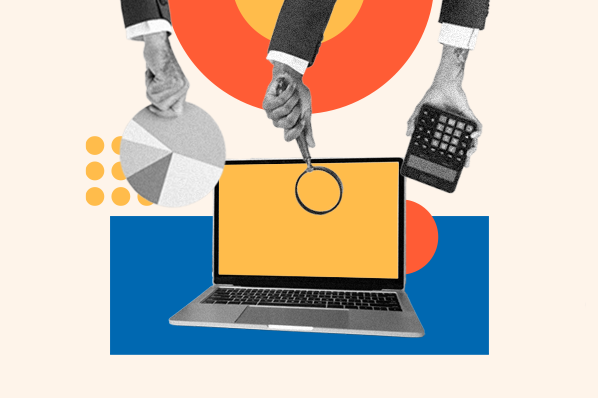As Elle Woods once said, "Whoever said orange is the new pink was seriously disturbed."

If you haven't seen Legally Blonde, Elle was referring to an attempt made by a brand to influence consumer behavior. However, its attempt fell short because the fictitious company failed to align with its target audience.
According to Salesforce, 76% of consumers expect companies to understand their needs and expectations.
In other words, customers want companies to understand their behavior. That's why understanding and influencing consumer behavior is essential for a marketer.
Below, let's discuss the theory of consumer behavior, then review some expert strategies for understanding and influencing customers.
Consumer Behavior
Consumer behavior studies customer activity. It describes their purchases, answering questions like, "Why did a customer want this product at this time?" and, "What emotional responses preceded their purchase?" Answers to these questions help marketers and sales reps understand their customers so they know how to position their products in the marketplace.
The Theory of Consumer Behavior
Consumer behavior is the study of how people spend their money. This is typically studied by economists so we can better understand how personal taste and income shape the economy. However, marketers also use this information to market their products.
To study consumer behavior and learn more about your buyer persona, consider the answers to these questions:
- How do your customers feel about certain brands or products?
- Why do they select one product over another?
- What's their research process like?
- Do they prefer to shop online?
- How important are reviews to their purchasing decisions?
Ultimately, the goal is to understand why consumers make the decisions they do so you can better market to them.
To fully understand consumer behavior, consider these factors that go into making a purchase:
Psychological
When people buy something, their mental headspace and mindset play a large factor. Ultimately, their perception, attitude, and background influence their final purchase.
Personal
Personal identification factors like age, financial background, culture, interests, and hobbies also play a role in a purchasing decision.
Social
Customers consider other people's thoughts and opinions before buying a product. They think, "What do my family and friends think of this product?" and, "How are the reviews?" Sometimes, they'll consider these elements without even thinking about it.
Consumer behavior as a marketing method emerged in the 1940s and 50s when marketing shifted away from relying on economics and instead focused on other disciplines like psychology and sociology. This lead to the development of an array of theories that analyze consumer behavior.
Consumer Behavior Theories
There are five main schools of thought regarding consumer behavior:
1. Psychoanalytic Theory
This theory states that consumers make purchasing decisions based on their feelings, hopes, aspirations, and fears. For example, if someone aspires to be a singer they're likely to purchase voice lessons or music recording software.
2. Veblenian Social-Psychological Theory
This model asserts that humans are social creatures and make purchases based on societal and cultural norms. For example, as gluten-free, vegetarian, and vegan options are becoming more prevalent in society, consumers are becoming more likely to purchase those options from restaurants.
3. Reasoned Action Theory
This is the theory that consumers make purchases when they expect a specific result. That's why marketers need to associate a positive result with purchasing their product. For example, marketers for a personal trainer associate overall health and weight loss with their workout program.
4. Maslow's Motivation-Need Theory
Maslow, a psychologist in the 1950s, created a needs-based hierarchy that explains why people make purchases. The hierarchy asserts that people buy things to fulfill needs: psychological (survival), safety, love, esteem, and self-actualization. For example, people buy alarm systems for their homes because they value and need safety.
5. Hawkins Stern Impulse Buying Theory
Although there are many reasons people buy things, sometimes very little thought goes into it. Impulse purchases occur when people buy products based on external stimuli. For example, if people see a candy bar in the checkout line, they might purchase it just because it's there.
For all these theories, creating a buyer persona will help you better understand your customer's motivations.
So, how can you influence consumer behavior in your marketing campaigns? Let's consult the experts.
Marketing Experts Reveal Consumer Behavior Strategies
In this section, we've gathered some consumer behavior strategies from expert marketers across various industries. Take a look at their tips to improve the impact of your next marketing campaign.
1. Dave Cherry - Cherry Advisory
Marketing Strategy: Predicting consumer behavior
An executive strategy advisor at Cherry Advisory, Cherry speaks about predicting consumer behavior.
He says, "The insights gained by knowing what a customer is going to do with accuracy is exponentially more valuable than knowing what they previously did (transactional data) or their demographic profiles."
With this in mind, if marketers can accurately predict consumer behavior, they'll see great success in their marketing campaigns.
For retailers, predicting consumer behavior can be as easy as understanding how the holidays impact purchasing decisions. Cherry says, "Using data from Prosper Insights, NRF frequently publishes their outlook on total spend, (e.g. Mother's Day spending is expected to increase by x% this year) as well as category spend, (e.g. flowers are predicted to be up y% and candy down z%). Many retailers can predict category/department, and sometimes choice level sales across their chain accurately."
While not all industries can use holidays as a predictor, especially B2B companies, seasonality can impact most industries. Think about when companies spend the most money. Is it the first quarter or the fourth quarter? When do people invest? These questions can help predict consumer behavior for B2B companies that can't necessarily rely on the same predictors for B2C companies.
Predicting consumer behavior essentially means to have the right product at the right price at the right time. Cherry says, "The right time not only refers to having inventory but also establishing that connection with customers within the right context. That's a challenge that many are still working to resolve."
2. Alex Birkett - HubSpot
Marketing Strategy: Collecting consumer behavior
As a senior marketing manager at HubSpot, Birkett is focused on achieving growth.
He says, "the best way to understand consumer behavior is to define your analytics strategy, map out critical behavioral events on the customer journey, define your business-critical goals and metrics, and find a way to instrument tracking for all of these. Through experimentation, segmentation, and cohort analysis, you can begin to learn more about what factors actually influence consumer behavior and what the impact of an experience is."
On the other hand, "the worst way to predict consumer behavior is by asking consumers directly what they're going to do or what they think; revealed preferences are generally different than stated preferences, and consumers are normally quite bad at articulating what they actually want and will do. Qualitative data can be great for experimentation ideation and discovering pain points, but it's very bad for diagnosis, causality, or telling you how to fix that pain point."
With this in mind, the best way to learn what factors influence consumer behavior is by running trustworthy controlled experiments.
3. Dayne Topkin - HubSpot
Marketing Strategy: Understanding consumer behavior
As a marketing manager at HubSpot, Topkin focuses on user experience (UX) and understanding user behavior.
He says, "There are several ways you could go about capturing your customers' motivation for interacting with your brand, and a lot of it will depend on how you have things structured and where your audience is engaging with the brand/company."
You could consider surveys, social media, or customer interviews. Engaging with your customers can help you understand their decisions.
Topkin adds, "You would be surprised at how willing users are to chat with you and share their experiences. These sessions should only last between 15-20 minutes and you should come prepared with specific questions to ask. We use Zoom for these user interviews/sessions and I've gained a ton of insight from these. Additionally, if you have any workflows set up for nurturing you might include an email that invites a user to talk about their experience with someone at your company then have a specific set of questions prepared for that session."
Additionally, you have to think about scalability as well. "A lot of organizations struggle with this because their methods are too grandiose and aren't scalable in the long run. Automate as much as you can as well — surveys, form fields, workflows, etc.," Topkin says.
4. Tim Friesner - Marketing Teacher
Marketing Strategy: Studying consumer behavior
As a marketing teacher, Friesner designs online marketing courses and training.
To study consumer behavior, he says you need to provide value and customer satisfaction as well as effectively target your customers.
Additionally, you want to understand how customers view your product versus your competitors. What's your competitive advantage? How can you improve your products and services?
If you keep these things in mind, you should begin to understand how to market your product or service to your customers.
5. Lars Perner - USC Marshall
Marketing Strategy: Applying consumer behavior
As a marketing teacher, Perner is an assistant professor of clinical marketing at USC.
He says, "The most obvious application of consumer behavior is for marketing strategy—i.e., for making better marketing campaigns. For example, by understanding that consumers are more receptive to food advertising when they are hungry, we learn to schedule snack advertisements late in the afternoon."
Additionally, you can apply your knowledge of consumer behavior in social marketing. Social marketing involves getting ideas across to consumers rather than selling something. This comes down to the social factor of purchasing something. Consumers consider cultural norms and think about how other people view them.
Understanding consumer behavior isn't an easy task. However, you can use these theories of consumer behavior to strategize your next marketing campaign.
Want to learn more about analyzing consumer behavior? Check out our beginner's guide.
![→ Download Now: Market Research Templates [Free Kit]](https://no-cache.hubspot.com/cta/default/53/6ba52ce7-bb69-4b63-965b-4ea21ba905da.png)



![The Beginner's Guide to the Competitive Matrix [+ Templates]](https://www.hubspot.com/hubfs/competitive-matrix-1-20240828-9831599.webp)
![9 Best Marketing Research Methods to Know Your Buyer Better [+ Examples]](https://www.hubspot.com/hubfs/marketing-research-methods-featured.png)
![SWOT Analysis: How To Do One [With Template & Examples]](https://www.hubspot.com/hubfs/marketingplan_20.webp)


![How to Run a Competitor Analysis [Free Guide]](https://www.hubspot.com/hubfs/Google%20Drive%20Integration/how%20to%20do%20a%20competitor%20analysis_122022.jpeg)
![5 Challenges Marketers Face in Understanding Audiences [New Data + Market Researcher Tips]](https://www.hubspot.com/hubfs/challenges%20marketers%20face%20in%20understanding%20the%20customer%20.png)
